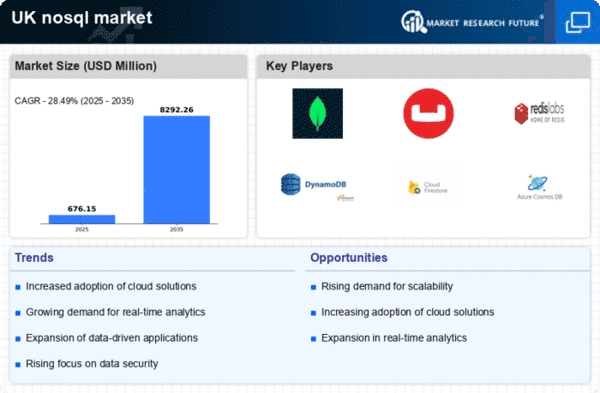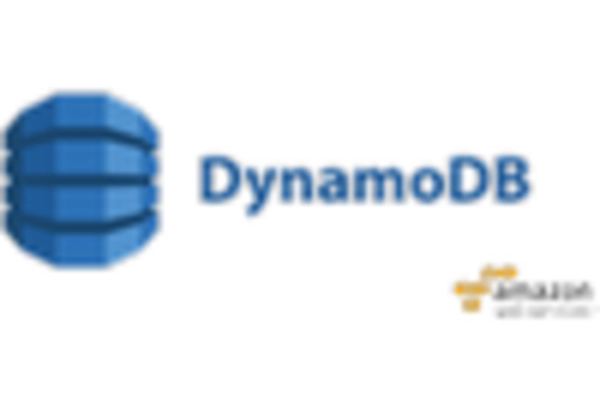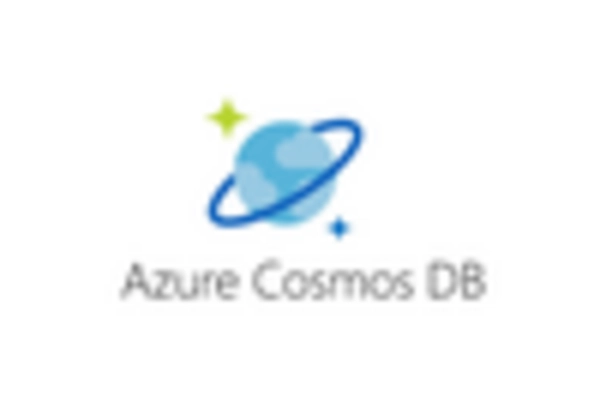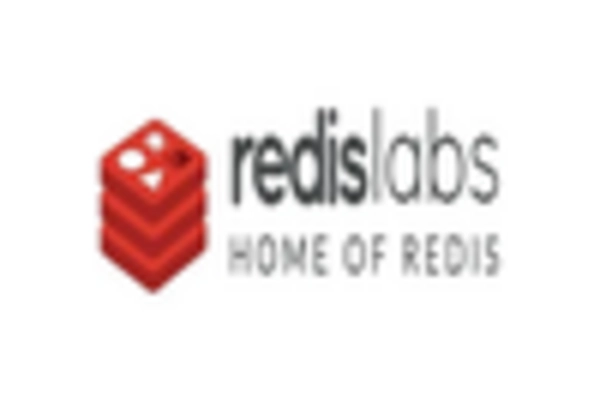Rising Demand for Big Data Analytics
The nosql market in the UK is experiencing a notable surge in demand for big data analytics. As businesses increasingly rely on data-driven decision-making, the need for scalable and flexible database solutions becomes paramount. The ability of nosql databases to handle vast amounts of unstructured data positions them as a preferred choice for organisations seeking to derive insights from complex datasets. According to recent estimates, the UK big data analytics market is projected to grow at a CAGR of approximately 12% over the next five years. This growth is likely to drive further adoption of nosql technologies, as companies look to enhance their analytical capabilities and improve operational efficiency. Consequently, the nosql market is poised to benefit significantly from this trend, as more enterprises invest in advanced data management solutions.
Increased Focus on Customer Experience
In the competitive landscape of the UK, businesses are placing a heightened emphasis on customer experience, which is influencing the nosql market. Companies are leveraging nosql databases to create personalised experiences by analysing customer behaviour and preferences in real-time. This capability allows organisations to respond swiftly to customer needs, thereby enhancing satisfaction and loyalty. The ability to store and process diverse data types, such as social media interactions and transaction histories, is crucial for developing effective customer engagement strategies. As organisations strive to differentiate themselves, the demand for nosql solutions that facilitate rapid data access and analysis is likely to increase. This trend suggests a robust growth trajectory for the nosql market, as businesses prioritise technologies that enable them to deliver superior customer experiences.
Growing Need for Agile Development Practices
The nosql market in the UK is being influenced by the growing need for agile development practices among software development teams. As organisations adopt agile methodologies, the demand for databases that support rapid iteration and deployment is increasing. Nosql databases offer the flexibility and scalability required for agile development, enabling teams to adapt quickly to changing requirements. This shift towards agile practices is likely to drive the adoption of nosql solutions, as developers seek tools that facilitate faster development cycles and improved collaboration. The ability to integrate seamlessly with modern development frameworks further enhances the appeal of nosql technologies. Consequently, the nosql market is expected to witness robust growth as more organisations embrace agile methodologies in their software development processes.
Adoption of Internet of Things (IoT) Solutions
The proliferation of Internet of Things (IoT) devices in the UK is driving significant changes in the nosql market. As IoT applications generate vast amounts of data, traditional relational databases often struggle to manage this influx effectively. Nosql databases, with their ability to scale horizontally and accommodate diverse data formats, are becoming essential for IoT deployments. Industries such as manufacturing, healthcare, and smart cities are increasingly adopting nosql solutions to manage and analyse data from connected devices. This trend is expected to propel the nosql market forward, as organisations seek to harness the potential of IoT for operational efficiency and innovation. The integration of nosql technologies into IoT ecosystems may lead to enhanced data processing capabilities, thereby fostering further advancements in the sector.
Emergence of Artificial Intelligence and Machine Learning
The integration of artificial intelligence (AI) and machine learning (ML) technologies is significantly impacting the nosql market in the UK. As organisations increasingly leverage AI and ML for data analysis and predictive modelling, the need for databases that can efficiently store and process large volumes of data becomes critical. Nosql databases, with their capacity to handle unstructured and semi-structured data, are well-suited for AI and ML applications. This trend is likely to drive further investment in nosql technologies, as businesses seek to enhance their analytical capabilities and improve decision-making processes. The convergence of AI, ML, and nosql solutions may lead to innovative applications across various sectors, thereby propelling the growth of the nosql market in the coming years.
















